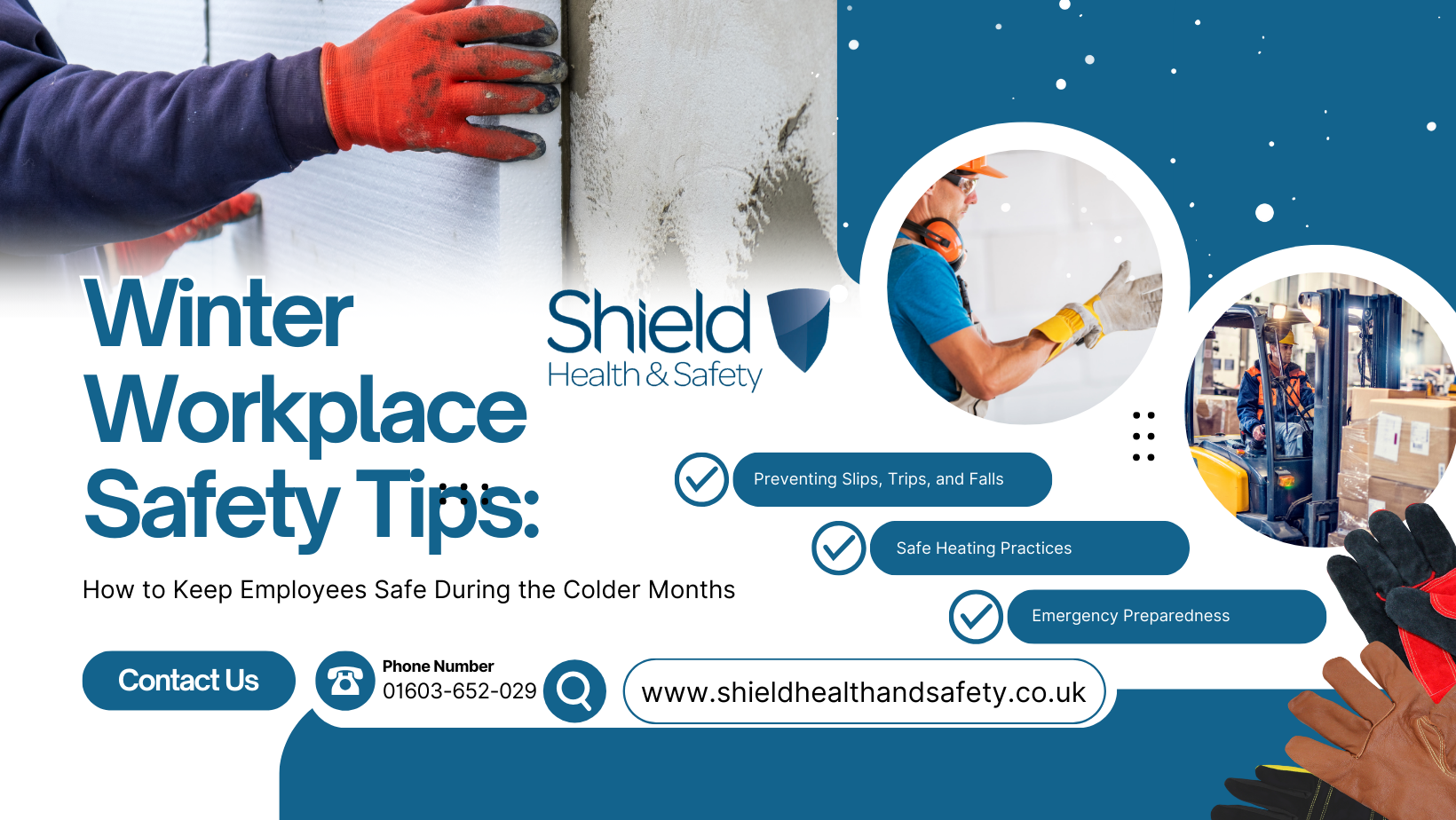Winter brings unique challenges for businesses, from icy walkways to unpredictable weather conditions. Ensuring workplace safety during this time is essential for protecting employees and maintaining productivity. At Shield Health and Safety Limited, we’ve compiled some key tips to help your team navigate winter safely, whether they’re working indoors or braving the cold outdoors.
𝟭. 𝗣𝗿𝗲𝘃𝗲𝗻𝘁𝗶𝗻𝗴 𝗦𝗹𝗶𝗽𝘀, 𝗧𝗿𝗶𝗽𝘀, 𝗮𝗻𝗱 𝗙𝗮𝗹𝗹𝘀
Icy and wet surfaces are a leading cause of workplace injuries in winter.
𝗖𝗹𝗲𝗮𝗿 𝗮𝗻𝗱 𝗧𝗿𝗲𝗮𝘁 𝗪𝗮𝗹𝗸𝘄𝗮𝘆𝘀: Regularly clear snow and ice from paths, entrances, and parking areas. Use grit or salt to reduce slipperiness.
𝗜𝗻𝘃𝗲𝘀𝘁 𝗶𝗻 𝗠𝗮𝘁𝘀 𝗮𝗻𝗱 𝗦𝗶𝗴𝗻𝗮𝗴𝗲: Place heavy-duty mats inside entryways to catch water and snow and use wet floor signs to alert staff to slippery areas.
𝗘𝗻𝗰𝗼𝘂𝗿𝗮𝗴𝗲 𝗣𝗿𝗼𝗽𝗲𝗿 𝗙𝗼𝗼𝘁𝘄𝗲𝗮𝗿: Encourage employees to wear slip-resistant shoes, especially those working outside or walking between sites.
𝟮. 𝗦𝗮𝗳𝗲 𝗛𝗲𝗮𝘁𝗶𝗻𝗴 𝗣𝗿𝗮𝗰𝘁𝗶𝗰𝗲𝘀
Keeping the workplace warm is essential but requires attention to safety.
𝗜𝗻𝘀𝗽𝗲𝗰𝘁 𝗛𝗲𝗮𝘁𝗶𝗻𝗴 𝗦𝘆𝘀𝘁𝗲𝗺𝘀: Schedule regular maintenance checks on boilers and heating systems to ensure they are functioning properly and efficiently.
𝗨𝘀𝗲 𝗣𝗼𝗿𝘁𝗮𝗯𝗹𝗲 𝗛𝗲𝗮𝘁𝗲𝗿𝘀 𝗦𝗮𝗳𝗲𝗹𝘆: If using portable heaters, ensure they have automatic shut-off features and are placed away from combustible materials.
𝗠𝗼𝗻𝗶𝘁𝗼𝗿 𝗔𝗶𝗿 𝗤𝘂𝗮𝗹𝗶𝘁𝘆: Avoid blocking ventilation and ensure heaters don’t emit harmful fumes in enclosed spaces.
𝟯. 𝗘𝗺𝗲𝗿𝗴𝗲𝗻𝗰𝘆 𝗣𝗿𝗲𝗽𝗮𝗿𝗲𝗱𝗻𝗲𝘀𝘀
Winter weather can be unpredictable, so it’s vital to have an emergency plan in place.
𝗖𝗼𝗺𝗺𝘂𝗻𝗶𝗰𝗮𝘁𝗲 𝗘𝗺𝗲𝗿𝗴𝗲𝗻𝗰𝘆 𝗣𝗿𝗼𝗰𝗲𝗱𝘂𝗿𝗲𝘀: Ensure all employees are familiar with evacuation routes and safety procedures in case of power outages, severe weather, or other emergencies.
𝗠𝗼𝗻𝗶𝘁𝗼𝗿 𝗪𝗲𝗮𝘁𝗵𝗲𝗿 𝗖𝗼𝗻𝗱𝗶𝘁𝗶𝗼𝗻𝘀: Use apps and alerts to track local weather and communicate potential disruptions to your staff promptly.
𝟰. 𝗦𝘂𝗽𝗽𝗼𝗿𝘁𝗶𝗻𝗴 𝗢𝘂𝘁𝗱𝗼𝗼𝗿 𝗪𝗼𝗿𝗸𝗲𝗿𝘀
Cold temperatures and adverse weather can put outdoor workers at risk of frostbite, hypothermia, and fatigue.
𝗣𝗿𝗼𝘃𝗶𝗱𝗲 𝗔𝗽𝗽𝗿𝗼𝗽𝗿𝗶𝗮𝘁𝗲 𝗖𝗹𝗼𝘁𝗵𝗶𝗻𝗴: Supply thermal layers, waterproof gear, and gloves to keep employees warm and dry.
𝗦𝗰𝗵𝗲𝗱𝘂𝗹𝗲 𝗕𝗿𝗲𝗮𝗸𝘀: Encourage regular warm-up breaks in heated areas to prevent cold stress.
𝗧𝗿𝗮𝗶𝗻 𝗦𝘁𝗮𝗳𝗳 𝗼𝗻 𝗖𝗼𝗹𝗱 𝗪𝗲𝗮𝘁𝗵𝗲𝗿 𝗥𝗶𝘀𝗸𝘀: Educate employees on recognising signs of cold-related illnesses and the importance of hydration.
𝟱. 𝗩𝗲𝗵𝗶𝗰𝗹𝗲 𝗦𝗮𝗳𝗲𝘁𝘆 𝗳𝗼𝗿 𝗦𝘁𝗮𝗳𝗳 𝗪𝗵𝗼 𝗗𝗿𝗶𝘃𝗲 𝗳𝗼𝗿 𝗪𝗼𝗿𝗸
Winter driving poses unique hazards like icy roads, reduced visibility, and breakdowns.
𝗣𝗿𝗲𝗽𝗮𝗿𝗲 𝗩𝗲𝗵𝗶𝗰𝗹𝗲𝘀: Ensure all company vehicles are serviced, with functioning brakes, lights, and windscreen wipers. Keep tyres properly inflated and equipped for winter conditions.
𝗣𝗹𝗮𝗻 𝗥𝗼𝘂𝘁𝗲𝘀: Encourage staff to use well-maintained roads and allow extra travel time during bad weather.
𝗪𝗵𝘆 𝗪𝗶𝗻𝘁𝗲𝗿 𝗦𝗮𝗳𝗲𝘁𝘆 𝗠𝗮𝘁𝘁𝗲𝗿𝘀
Creating a safe workplace in winter isn’t just about compliance — it’s about showing employees that their well-being is a priority. By addressing common winter hazards, you can reduce accidents, increase morale, and maintain productivity throughout the season.
Shield Health and Safety Limited is here to support your business with tailored safety solutions, from workplace audits to employee training.
Contact us today to learn how we can help you create a safer environment year-round.

